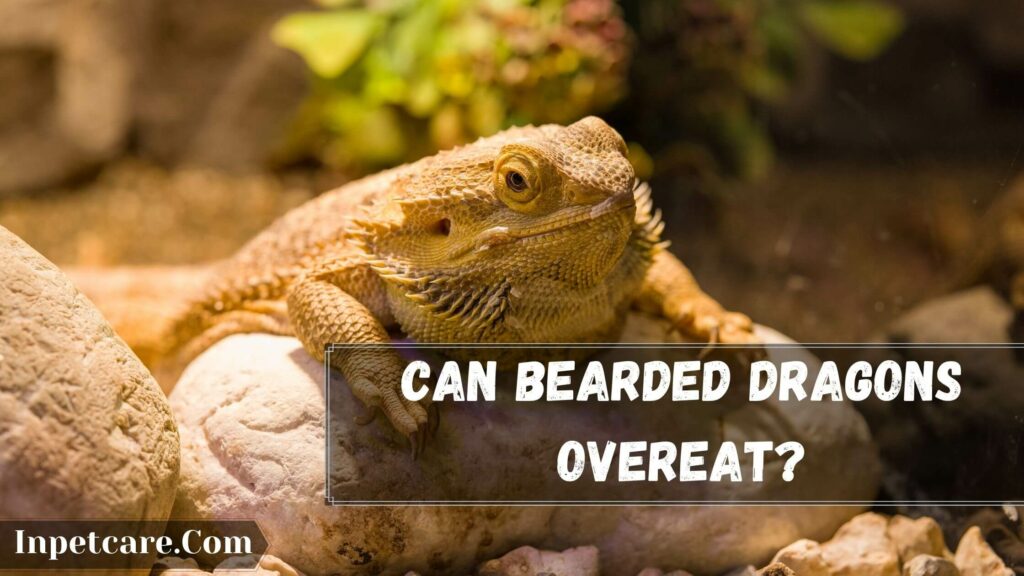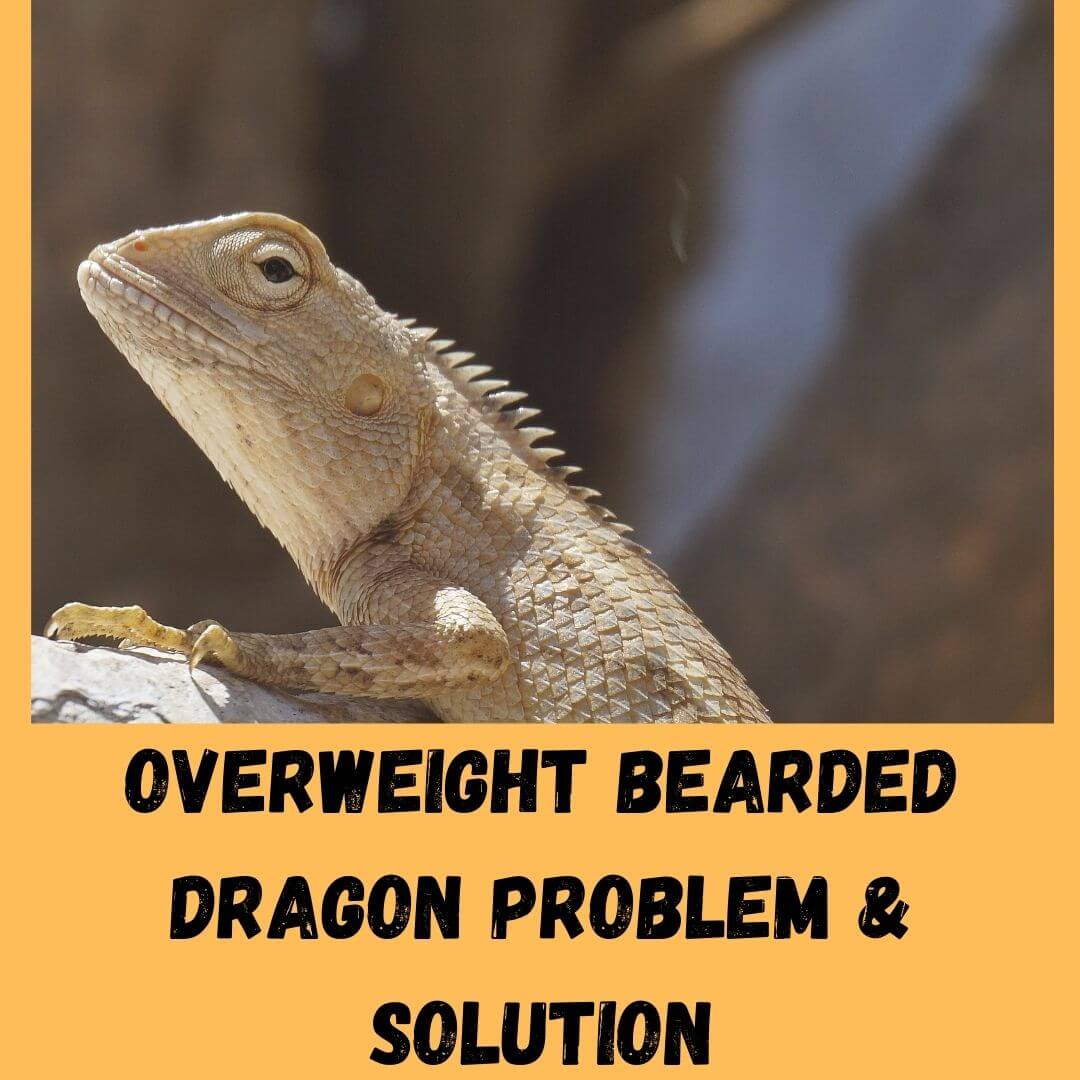Being a responsible pet owner owning a Bearded dragon comes with many perks. This also means you have to care for him from all aspects. One of these aspects is its diet. Make sure to pay close attention to what you feel about a bearded dragon so that it doesn’t become overweight.
Just like us, excess weight gain in bearded dragons can pose a higher risk of health issues. A poor diet can significantly reduce their quality of life. Ensure the bearded Dragon is not overweight; otherwise, their lifespan will shorten.
In this article, we are going to discuss why bearded dragons are fat and can bearded dragons overeat. We will also discuss how an overweight Dragon looks and how to make a bearded dragon lose weight.
Post Contents
Can Bearded Dragons Overeat?

Yes, bearded Dragons can easily Overeat if there are a lot of food, especially varieties of food available around them to choose from. When it comes to feeding, professional guidance and precision are needed; otherwise, overfeeding will result in excessive weight gain, injury, illness and even death.
5 Signs That Your Beardie is Sick
- Eye Issues
- Being Lethargic
- Sudden Weight Loss
- Excessive Secretion
- Discolouration
What Does A Obese Bearded Dragon Look Like?
Bearded dragons that are overweight usually feature a round belly which is visible from the top very easily. The tail of a bearded dragon will also seem very thick due to excessive fat, especially at the base level.
Talking about other areas, the jawline area will be exposed, looking large and distended. An Overweight bearded dragon’s backbones are not easily visible. Let’s talk about why is my bearded dragon fat.
Usually, there are five particular areas where bearded Dragon carries excessive weight. It is easy to determine an overweight bearded dragon by looking at some point of their body.
Did you know that too much weight gain can cause a serious problem for these lizards? It is important to maintain a healthy lifestyle for them. Make sure to offer proper care and maintain your diet to prevent becoming overweight.
Why Is My Bearded Dragon Fat?
We are going to discuss seven major reasons why my bearded Dragon is fat. Let me tell you; an overweight bearded Dragon is always concerning. There are lots of bad consequences of keeping your Dragon heavyweight. Let’s talk about the main reasons or factors that make a bearded dragon gain weight excessively.
9 Reasons Why Bearded Dragon Is Overweight
- Dietary intake with high carbs or fats.
- Serving a large amount of food, accompanied by regular exercise or activities.
- A diet for feeding that doesn’t consider the lower metabolic rate.
- Make sure your bearded dragon is in unsuitable thermal radiation.
- Poor Uv bulbs or their setting.
- Do not provide a condition that encourages Brumation.
- They are Stressed.
- Keeps in an enclosed space.
- There is no mental stimulation.
5 Reasons Why Beardies Should Not Be Overweight
- Organ failure or dysfunction
- The shorter duration
- Dystocia
- Fatty liver
- Prolapse
How Do I Know If My Bearded Dragon Is Too Fat?
If your Bearded Dragon has a round belly or excessive fat tail, especially at the base, he is too fat. Being overweight actually means your bearded Dragon has more weight than needed. You will see beardies doing less activity due to weekend bones and joints.
Therefore, the bearded Dragon becomes lazy. Overweight beardies wol show lethargic behaviour and gasp noises. A bearded dragon that is too fat is also at higher risk of developing a fatty liver. A female bearded dragon with excessive weight gain will also develop issues with eggs and hormones.
Female Bearded Dragon that is overweight, egg binding issues and hormonal problems usually take place. Excessive fats also get released into a bearded dragon system causing organ failure or dysfunction. There are five signs your bearded Dragon is extremely fat.
4 Signs Your Beardie Is Fat
- The abdomen is round and distended at the top.
- Bearded Dragon with a large tail base.
- Jawline appears larger and distended. Bulge arms.
- The spines and ribs aren’t visible, nor can they be felt.
How Do I Get My Bearded Dragon To Lose Weight?
Let Him/Her Brumate
It is best to let your bearded Dragon brumate as it helps them lose weight. While brumating, your bearded Dragon will not eat or drink anything. If are bearded Dragon is showing signs of brumation, let him/her.
Cremation is one of the best ways to make your bearded Dragon lose weight. The brumation process is a natural phenomenon that should never be underestimated, especially when it comes to bearded dragon well-being.
Change Diet
In Reality, when we decide to lose weight, one of the first things that we do is to cut our carbs and fat count. It is common for humans to adjust their diet when they need to lose weight. Therefore you can do the same for your bearded Dragon as well.
You can either completely alter your diet or make little changes. It is best to always offer low quality food with more greens. Make sure you also include protein-based foods, especially insects, as it’s an important part of their diet. A bearded dragon needs everything in moderation as their omnivorous reptile.
Make Your Beardie Work To Eat.
Firstly, you need to make sure you are not using any loose substrate that is being eaten by Your beardies. If there is no loose substrate, you can place a few mealworms or cricket or any other insect at a time in the tank. It is best to provide live insects.
Live insects will make a bearded dragon hunt and chase them before eating them. This practice will make your beardie work to eat food. Even though this feeding method will take longer, it is best to make them lose weight through exercise.
In a 15 minute span of time, a bearded dragon will be able to eat fewer insects while working more. You can also use feeding tongs to feed your beardies by holding the bug higher in the tank. Holding the insect higher in the tank will make your bearded Dragon either climb or stand up higher to eat it.
You can also hang some salads using a clip on the top of your bearded dragon tank to make it stand up and get it. If your beardies don’t like vegetables, you can also go with fruits. If this doesn’t interest them in eating, try another method.
Interesting Further Reading
- Here’s Why Baby Bearded Dragon Not Eating
- Bearded Dragon Brumation – A Complete Guide (With Photos)
- What to Feed Bearded Dragon Baby? – Proper Diet Plan
Offer Detoxifying Supplements.
If your bearded Dragon has excessive weight on its body, you can also try some supplements. There are lots of detoxifying supplements that can help your Dragon prevent developing fatty liver disease. You can always purchase milk thistle, which is the natural herb to help your bearded dragon support liver function.
You can also go with the serrapeptase as it is an enzyme taken from a silkworm intestine to clean the blood and liver of reptiles like beardies. These supplements in a moderate dosage can really help your bearded Dragon support their body function.
Always offer milk thistle at the doses of 15 mg/kg. It can be quite difficult for you to measure the dose you need for a bearded dragon as it is scaled on a milligram: which jewellery scales can even weigh. You usually need less than half of a milligram to feed a single beardie.
Therefore, you won’t be able to get a proper dosage of this supplement which is why I would recommend using only A pinch of it, just like you had taken a pinch of salt. If you are using a capsule, then you can open it up and take a pinch.
There is also a liquid form of serrapeptase available for the bearded dragon supplementation. You can use a drop. Make sure to offer the supplement only once a day to Overweight beardies and every other day to a healthy ones.
Make Your Beardie To Eat Slow
When you are going to offer food to a bearded dragon, make sure to add only a little. Bearded dragons are known to eat quite quickly. If you notice all the food being eaten by your beardie, avoid filling it up again. In the wild, bearded dragons need to hunt for their food.
They never get to eat all by sitting in one place. Therefore it is a good idea to only offer limited food and spread it out on a large plate. You can also place their food around different corners of their enclosure to push them to eat slowly. Let’s take a quick look at some frequently asked questions on why is my bearded dragon fat and what to do.
FAQ
Conclusion
Obesity in bearded dragons is really a serious problem that needs proper treatment before it has an adverse impact on their health. When looking for signs of an overweight bearded dragon, usually look at the tail, jawline, arms and abdomen area.
If their spine is not feelable, they are overweight. In most cases, these areas either look very large or distended. I have tried my best to give you all the information about why is my bearded dragon fat to help you give all the information about their obesity.
If you have any other questions regarding beardies’ weight gain or obesity, ask in the comment section. If you like our post on why is my bearded dragon fat, consider sharing it with others. Sharing this with other fellows will help them make their pet lose weight and increase its lifespan. Your share can save someone’s pet life & its longevity.

94% of pet owners say their animal pal makes them smile more than once a day. In 2007, I realized that I was made for saving Animals. My father is a Vet, and I think every pet deserves one. I started this blog, “InPetCare”, in 2019 with my father to enlighten a wider audience.
